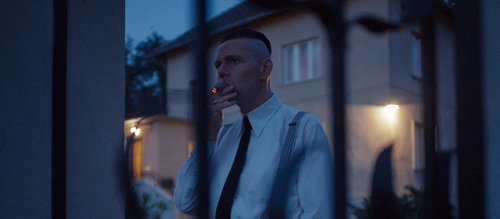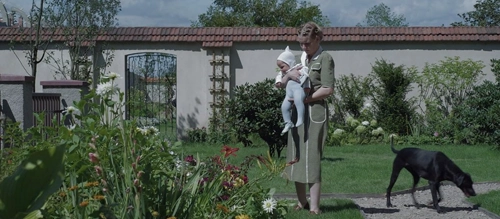The Zone of Interest (2023) Review

The Zone of Interest (2023)
Director: Jonathan Glazer
Screenwriter: Jonathan Glazer
Starring: Christian Friedel, Sandra Hüller
Are you sitting comfortably? Good. You ought to be. You’re reading this on a machine that uses rare materials mined by children, on internet you access through a system of wiring that deteriorates ecosystems, in a space that would once act as a flood plain, a natural habitat, a protected green area. You buy products sourced from sweatshops, or manufactured by companies with stakes in them; you eat well, you sleep warm, and you wash your clothes and flush your toilet with clean water. But just over the fence, almost out of view, there’s slave labour, exploitation, ecological disaster, starvation and murder. There are wars raging, ideological differences putting an end to thousands and millions of lives. The Zone of Interest, the first film from acclaimed director Jonathan Glazer in 10 years, brings your attention to all of these horrors of modern living, and forces you to question your own morality as a person existing in the current global economy, and yet it is even more powerful in how it manages to establish itself as one of the greatest holocaust films ever made. Just over the fence of the Höss family’s idyllic house lie the camps of Auschwitz, and as is the case with our modern living, denial, ignorance, racism and mechanical thinking legitimise to them the exploitation and terror that exists over the wall, just out of view.
There has been perhaps no greater modern tragedy than the holocaust, a genocide conducted by the Nazi Party of Germany on Jewish people between 1941 and 1945 that took the lives of six million. That’s around the same number of people as currently live in Dallas, Texas, in Toronto, Canada, in the entirety of Ireland. It’s more people than currently inhabit Philadelphia, Barcelona, Johannesburg or St. Petersburg. The Zone of Interest acts as a complimentary piece to the films that are about the suffering of the genocide, such as Steven Spielberg’s Schindler’s List, painting the inhumanity of those whom imprisoned, tortured, and killed, the millions of Jews. In Jonathan Glazer’s film adaptation of Martin Amis’ novel of the same name, you won’t find a single redeeming quality in any of the characters, not a single shred of hope that humanity is good after all.
The Zone of Interest tells, quite simply, of the life of the Höss family whose patriarch is a senior officer at the Auschwitz camp and whose wife, children and local “help” inhabit the house that is attached to it. They go about their daily lives, bathing in the river, maintaining their garden, talking about holidays and gossiping about other families. They are horrifying in how normal they are, and how normalised their behaviour is.
It would be wrong to describe lead actors Christian Friedel and Sandra Hüller as being impressive in their roles, as they inhabit characters that we are not supposed to find a single redeeming quality in. They chat, they dream, they look after each other, and look after their children, though quickly we understand that they chat irregularly and about horrifying things, that they dream about holidaying in partnering nations under the rule of dictators, that their children are left to “the help” at any time anything more convenient comes along, and that they cheat on each other through twisted power dynamic sexual relationships. Every time you find a strand of the narrative to invest in, to go along with, or an element of their performances to relate to, the film reminds you that doing so is wrong – you don’t want to root for anyone here, and that’s the whole point. The film actively works against offering any path towards rationalising these awful, inhumane people.

Director Jonathan Glazer and cinematographer Łukasz Żal (Cold War) offer some of the decade’s most impactful work, the lens a cold and observant eye that is positioned at all times with the intention of illustrating everything it possibly can. We are familiar with the layout of the Höss family home within minutes; we get to know the walls, and the people who inhabit them, and then we realise that the house is like the people: normal at first glance, but hiding a terrifying truth. This is a film photographed with purpose under the stewardship of a director who uses every element of film language to portray a palpable reality that underlines the intentions of the piece: that these people are inhumane, that these acts occurred within a lifetime ago, and that we must now acknowledge these horrors and how quickly we might fall back into normalising them. Perhaps how we should be aware of how in many ways we already have.
There is barely any score, the silence heightening your awareness of the behaviours apparent, and the importance of close-ups and other traditionally empathy-leading camera angles is secondary to the use of editing to depict the horrors that unfold. What score there is, from Mica Levi, is impactful and characteristically horrifying, and the angles that are used more often than not accentuate terrifying behaviour as opposed to trying to illuminate humanity. It’s all in service of this multi-faceted piece on very real events from the past that continue to haunt us today; an incredibly intelligent feat of cinema language.
The Zone of Interest is more than a film of the year, it’s a film of the decade. As was the case with his previous film Under the Skin, Jonathan Glazer has made something wholly unique to him, in this case never sacrificing the deeply meaningful material that he is adapting. This is cold, horrifying cinema of the highest standard; a piece that becomes more meaningful and important the more you pick at it, unravel it, contemplate it. With a few strokes of unrivalled genius, and the intent to tell of the true horrors of the past in a meaningful way to our contemporary world, Jonathan Glazer has constructed a masterpiece of the form that should have you questioning how you sleep at night.
Score: 24/24
Recommended for you: Oscars 2024 Nominations – Full List

